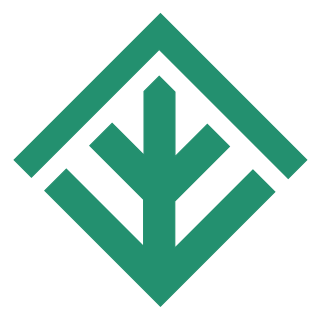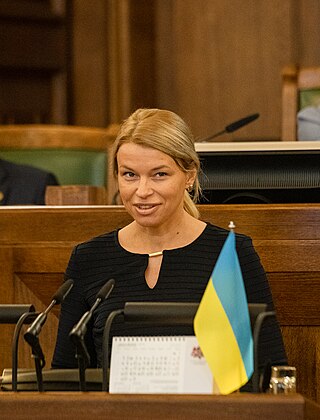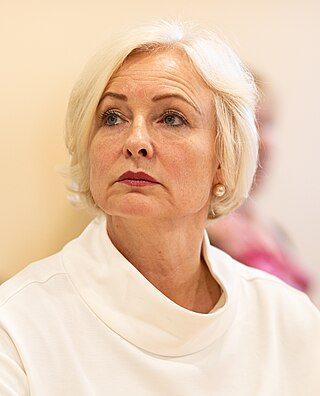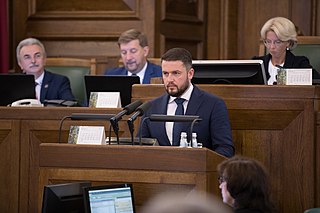
The Latvian Social Democratic Workers' Party is a social-democratic political party in Latvia and the second oldest existing Latvian political party after the Latvian Farmers' Union. It is currently represented with two seats in the parliament of Latvia as a part of the Union of Greens and Farmers alliance after an absence of 20 years. The party tends to hold a less Russophilic view than fellow social-democratic party "Harmony".

The Latvian Green Party is a green conservative political party in Latvia.

The Union of Greens and Farmers is an agrarian political alliance in Latvia. It is made up of the Latvian Farmers' Union, Latvian Social Democratic Workers' Party, and For Latvia and Ventspils.

Parliamentary elections were held in Latvia on 2 October 2010. It was the first parliamentary election to be held in Latvia since the beginning of the economic crisis during which Latvia had experienced one of the deepest recessions in the world.

Parliamentary elections were held in Latvia on 6 October 2018. Following the elections, a coalition government was formed by Who owns the state?, the New Conservative Party, Development/For!, the National Alliance and New Unity. Despite being from the smallest elected party, Arturs Krišjānis Kariņš of New Unity was chosen as prime minister.

The New Unity is a centre-right political alliance in Latvia. Its members are Unity and four other regional parties, and it is orientated towards liberal-conservatism and liberalism.

The Latvian Association of Regions or Latvian Regional Alliance is a centrist political party in Latvia.

The New Conservative Party, known as The Conservatives from February 2022 to October 2023, is a liberal-conservative political party in Latvia.
Development/For! was a liberal political alliance in Latvia. It was formed in 2018 and was composed of Movement For! (Par), For Latvia's Development (LA) and Izaugsme.

Aldis Gobzems is a Latvian politician and lawyer. He first rose to prominence as a lawyer who represented victims of the 2013 Zolitūde shopping centre roof collapse, and was the prime ministerial candidate for the Who Owns the State? party in the 2018 Latvian parliamentary elections.

Centre Party is a political party in Latvia. It was founded on 11 November 2005 under the name "All-Latvian Party 21st Century", renamed the Latvian movement "SOLIDARITY" in 2009, in 2016 became the Latvian Centrist Party, but since November 7, 2018 has been operating under the current name. The party advertises itself as a "patriotic, Christian-conservative party representing the majority of Latvian society."

Latvia First is a right-wing populist political party in Latvia.
In the run-up to the 2022 Latvian parliamentary election, various organisations carried out opinion polling to gauge voting intentions in Latvia. Results of such polls are displayed in this list.

The Fourteenth Saeima of Latvia was elected in the 2022 Latvian parliamentary election held on 1 October 2022.
Juris Jakovins is a Latvian doctor and politician. He is currently a member of the 14th Saeima, representing the Latvian Farmers' Union and the Union of Greens and Farmers. Previously, he was a member of the Valmiera City Council (2013–2021) and Valmiera Municipality (2021–2022).

Glorija Grevcova is a Latvian politician. She was elected to the 14th Saeima in 2022 as a member of For Stability! from which she later switched to the Alliance of Young Latvians.

Daiga Mieriņa is a Latvian politician who has been serving as the Speaker of the Saeima since 20 September 2023.

Andris Morozovs is a Latvian entrepreneur and politician, representing the Harmony party. He served as a member of the 12th Saeima and is currently a member of the Riga City Council.

Andris Šuvajevs is a Latvian economic anthropologist, researcher, and politician. He currently serves as a member of the 14th Saeima, representing the Progressives party. Since April 29, 2023, he has been the Deputy Chairman of the Progressives.
Force of People's Power is a minor conservative populist Latvian political party founded in 2007 under the name Force in Unity which operated under the name Alternative from 2012 to 2022.




















